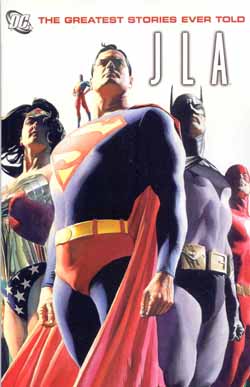 Â
Â
By various (DC Comics)
ISBN 1-84576-305-X
With all the interest generated by DC’s mass crossover event Infinite Crisis, not to mention the continuing popularity of the Justice League Unlimited animated series, it was inevitable that yet another compilation of classic tales would be forthcoming from the burgeoning archives of the “World’s Greatest Superheroesâ€. Many will quibble with the title of the collection. The tales presented here are without doubt, not the very best examples from the title’s chequered, 46 year history – most of those have already been reprinted – but nonetheless this selection does illustrate why the series has such faithful fans.
The mandatory origin is from 1982, when the first volume of the comic book series reached its 200th issue, with fan favourite artist George Pérez illustrating Gerry Conway’s subtle updating of the legend. Then, “The Super-Exiles of Earth†(Justice League of America #19, 1963) by Gardner Fox, Mike Sekowsky and Bernard Sachs is a standard high-quality adventure with the heroes forced to leave Earth only to sneak back in their civilian identities – unknown even to each other at this time – and thwart the dastardly Dr Destiny. At tale’s end the Leaguers operate on their own minds to expunge the knowledge of those secret identities.
This twin theme of mind control and secret identity, so pivotal to the Identity Crisis/Infinite Crisis scenarios is again revisited with “Snapper Carr – Super Traitor†(Justice League of America #77, 1969) as Denny O’Neil and Dick Dillin/Joe Giella reflect those troubled flower-power days in a tale of deceit, betrayal and revelation. Civil liberties just didn’t seem to apply to the inside of heads back then.
Justice League of America #122, 1975 provides another adventure of memory manipulation with “The Great Identity Crisis†as scripter Marty Pasko reveals how a master plan of the villainous Dr Light was the reason the heroes finally trusted each other with their civilian secrets. Dillin once again illustrates, with Frank McLaughlin providing the inking. “The League That Defeated Itself†(Justice League of America #166-168, 1979) is a rather mediocre body-swapping yarn featuring the Secret Society of Super Villains, by Conway, Dillin and McLaughlin, but has become the pivotal plot maguffin of the current high-tension JLA continuity. It just shows how a skilful re-interpretation of past tales can be a more effective tool than simply destroying the universe and starting over – and over – and over.
Next up is the first issue of Justice League, an immensely successful re-launch from 1987 that balanced the meta-human thrills with deprecating humour and zingy one-liners to great effect. “Born Again†comes courtesy of Keith Giffin, J M DeMatteis, Kevin Maguire and Terry Austin, who recently revived the whole concept with the series Formerly Known as the Justice League (also available as a graphic novel).
“Star-seed†from JLA Secret Files #1 (1997) was the reincarnation of the last but one team (as of this writing a new regular – 4th? – series is back again). Grant Morrison and Mark Millar reinvigorated the team-concept and Howard Porter and John Dell supplied the art-gloss demanded by modern fans. The plot involves a reinterpretation of the very first adventure wherein a starfish from outer space tries to conquer the world. The last story comes from JLA #61 (2002), courtesy of Joe Kelly, Doug Mahnke and Tom Nguyen. In “Two-Minute Warning†we see a snapshot of each member over a crucial, if routine, moment of their lives.
Without this team, this concept, we would arguably not be here now. Stan Lee cites the initial success of the series as the impetus for Marvel’s Fantastic Four. It certainly played a part in cementing superheroes and the comic-book inextricably together in the public consciousness. These yarns are certainly worth reading, and if you’re a newcomer or late returnee drawn in by the current media attention, despite not being the absolute “greatest storiesâ€, they are at least entertaining and thematically relevant. And surely that’s not such a bad thing?
Compilation © 2006 DC Comics. All Rights Reserved.
